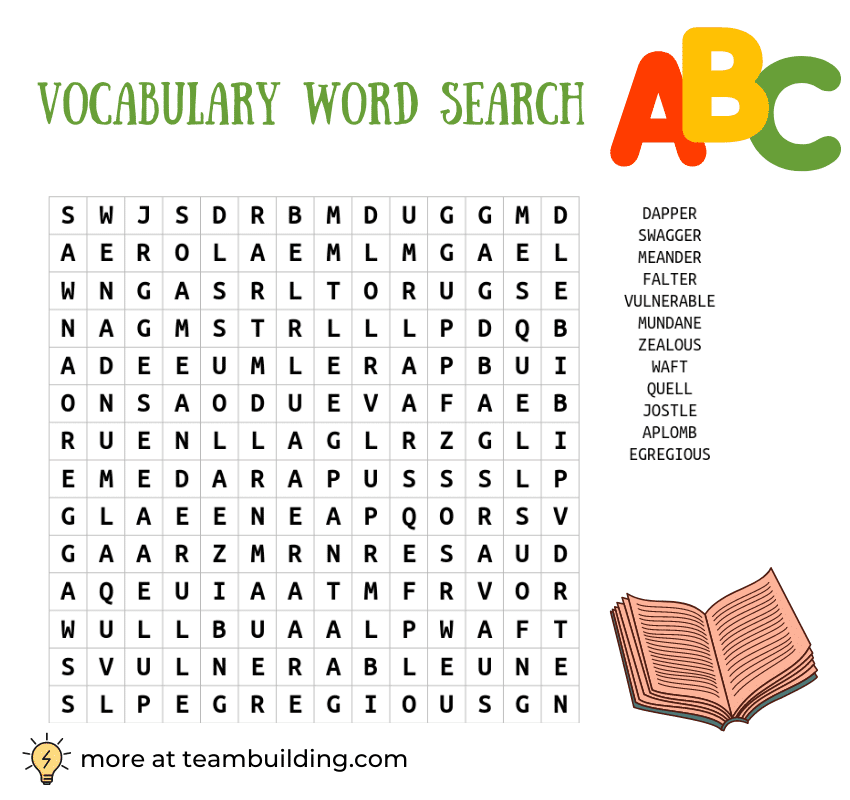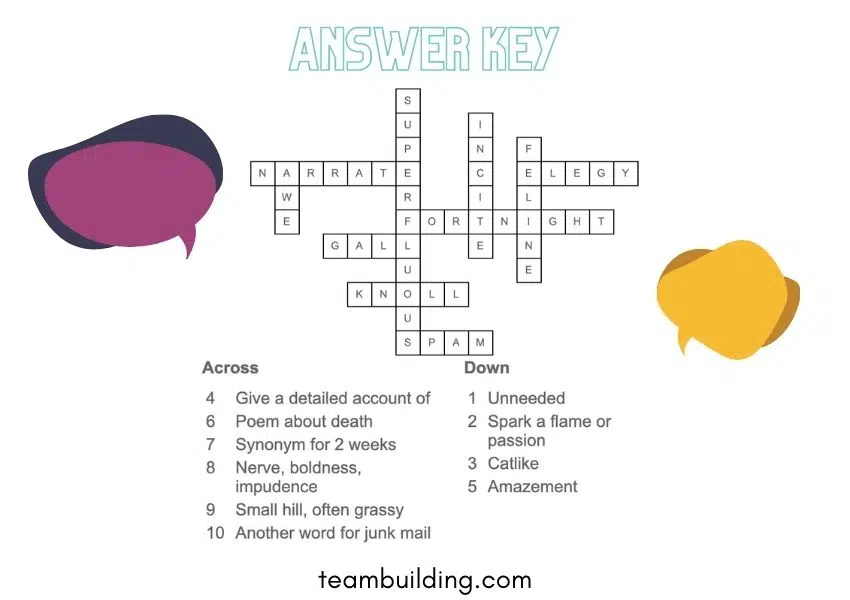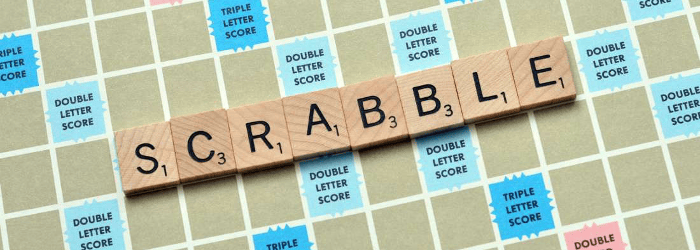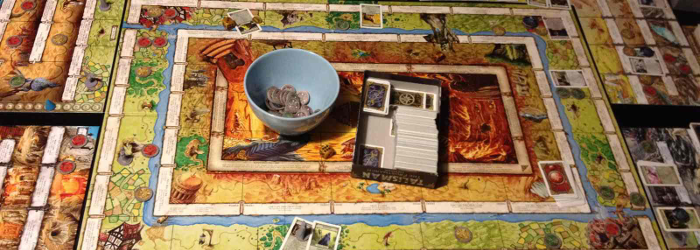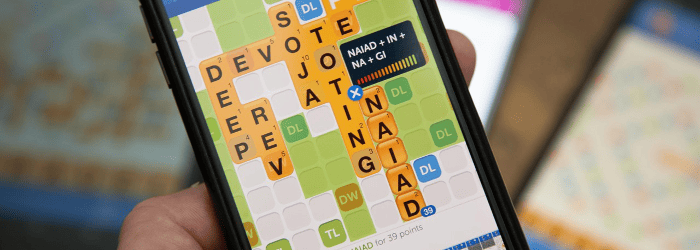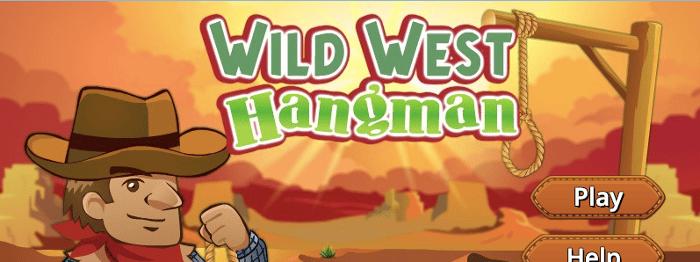You found our list of fun and simple vocabulary games for adults.
Vocabulary games are activities that include language and wordplay. Example games include Word Association and Hang Man. Players can enjoy vocabulary games in person or online. The purpose of these games is to strengthen vocabulary skills. These games are also known as “vocab games”, “letter games” and “vocabulary building games.”
These games make great online classroom activities and communication games, and can be used as online fun activities for employees.
This list includes:
- vocabulary games for adults
- simple vocabulary word games for adults
- fun online vocabulary games and activities
- English vocabulary games
- vocabulary games in English
- games to improve vocabulary
- vocabulary building activities
- vocab review games
- vocabulary games for students
Get ready to play!
List of vocabulary games
From Pictionary to word scrambles to synonym memory, here is a list of fun word games to play in classrooms, at parties, or during meetings.
1. Vocabulary Pictionary
Pictionary is a game of charades where players draw words instead of acting them out.
To play:
- Split the group into teams.
- Each round, assign one team member to draw.
- Give the drawing team member a word.
- Allow up to sixty seconds for teammates to guess.
- If the team guesses correctly, then assign one point.
You can give other teams the opportunity to steal, or move onto the next team’s turn. The game is a great way to practice new vocabulary, as players connect the word with an image. Pictionary is a fun game for virtual parties or in-person affairs.
To play Pictionary online, draw on the whiteboard app feature on your online meeting software.
2. Word Association
Word Association is one of the best vocabulary games for kids and classrooms since playing does not require a large vocabulary. The rules are simple and easy to understand. Typically, the game involves two players.
To play:
- Player one says a word.
- Player two responds with the first word that comes to mind.
- Player one either chooses a new word or responds to player two’s word.
- The game continues until one player repeats a word or pauses too long.
The rapid pace of the game generates excitement and occasionally results in funny answers.
If a student makes a mistake, then the teacher can pause the game and ask the student to explain or find a more fitting word. Ideally, gamemasters should allow players a few extra seconds to respond. Players should never feel embarrassed. There are no wrong answers in word association, but the game can serve as a learning opportunity to find better words.
If playing via Zoom, then player one or the teacher speaks a word, and other students answer in the chat. The class counts up matching answers and discusses different responses, guessing the reasoning behind each answer.
3. Vocabulary Hangman
Hangman is a classic chalkboard word game that translates easily to online play, thanks to digital whiteboards.
To play:
- Assign a player a word.
- The player draws a series of blanks corresponding to the number of letters in the word.
- Other players guess letters.
- If the letter is in the word, then the “executioner” fills in the blank. If not, then the executioner draws one portion of the gallows.
- The game ends when players guess the word, or when the picture is complete.
The best words to use for hangman contain less-used letters like z, x, and q. Examples of hard hangman words include zigzagging, razzmatazz, and quadrants.
4. Word search
Word searches are common classroom vocabulary games. These activities work well for handouts, and you can play during video calls by using the whiteboard feature and enabling annotation.
We made a sample word search you can use.
To make the game more competitive and exciting, turn the challenge into a race and award prizes to the first players to complete the puzzles.
5. Crossword
Crossword puzzles consist of a series of interconnecting boxes, each of which starts blank but contains one letter by the end of the game. Under the puzzle are two lists of clues, across and down respectively. Solvers need to consider the meaning of words, number of letters, and surrounding words, making the game strategic as well as literary.
Here is an example of a crossword puzzle you can use with your class or team.
Here is the answer key.
Crosswords are great word games for any age or skill level because puzzle makers can adjust the difficulty to suit players. To make your own crossword puzzle, use an online crossword creator.
6. Word Scramble
Word scrambles make great games for English class, and adults enjoy these language brain teasers as well. Simply mix up the order of the letters and ask players to unscramble and identify the original words.
Here is a sample to start with.
And here is the answer key.
To make your own word scrambles, use an online letter randomizer.
7. Scrabble
Scrabble is one of the most popular word games for adults or children. Players must use letter tiles to assemble words on the game board.
To play:
- Each player draws seven letter tiles.
- During turns, players can play tiles or exchange them for new letters.
- Players build words on the board, with each new word connecting to an existing word.
- Tiles have a point value assigned depending on the challenge of the letter. When a player makes a word, tally the letter and add the score to the point board.
More challenging letters have higher point values. For example, E is one point, while Z is ten. To find the point values for each tile and read more gameplay tips, check out this guide from Hasbro.
To coordinate the game for language lessons, assign higher scores for vocabulary words, and ask players to use the words in a sentence for extra points.
Scrabble is easy to play online, too, making it one of the best online vocabulary games. To play virtually, simply find a multiplayer online version of the game, such as Words With Friends.
8. Scattergories
Scattergories is one of the most fun and simple word games for adults. The game challenges players to think up words all starting with the same letter.
To play:
- One player rolls a letter die or uses a letter generator to pick the first letter.
- The timekeeper puts 60 seconds on the clock.
- Players write down one answer per category starting with the letter.
- When time runs out, players read the answers.
- Players receive a point for every answer.
Alliterative phrases count for double or triple points. If two players have the same answer, then they must cross it out and neither receives points. Of course, a player will not receive points for blank answers either. At the end of each round, the player with the most points wins.
Here is a list of sample Scattergories categories:
- A boy’s name, girl’s name, or gender neutral name
- Capital cities
- Four letter words
- Types of drinks
- Holidays
- Careers or professions
- Cartoon characters
- Websites
- Desserts
You could create more inventive categories for the game, or challenge players to make up prompts.
To play virtually, use the chat, screen-share, whiteboard functions in your virtual meeting platform. You can also share a Google Doc or Form, or join a multiplayer online Scattergories game together.
9. Tree or Bob Ross
Tree or Bob Ross is a fun video conference game that challenges players to guess a word by asking questions.
The player who conjures the word is The Post. The Post answers This or That questions whose answers help players narrow down the word.
The first question of the game is usually “is it more like a tree, or more like Bob Ross?” and The Post must answer accordingly. For instance, a rose is probably more like a tree, but Pinnochio presents an interesting challenge.
Each turn, the guesser adds a new word. For example, the second question might be, “is it more like a tree or a fern?” The game continues until players guess correctly. For more excitement, introduce a time limit, or award more points if players guess the word during earlier rounds.
10. Vocabulary Pyramid
Pyramid challenges players to guess words from context clues. The pyramid is a collection of six words, arranged with three on the bottom, two in the middle, and one at the top. To win, teams must guess all words within the pyramid in the allotted time.
To play:
- Divide the group into teams.
- Give one player on each team the pyramid.
- The pyramid holder must give hints to teammates describing each word without using the actual name of the item.
- When players guess correctly, the pyramid master can move to the next word. Or, players can say “pass,” and return to the word later.
- Teams receive a point for every correct guess.
When determining the time limit, consider the age of your players and the difficulty of the words. In general, 30 seconds per word, or three minutes total, is a good place to start, but add or take away time to increase or decrease the challenge.
11. Invisible Bridge
Invisible Bridge is similar to six degrees of Kevin Bacon. In both games, you must figure out a way to connect two seemingly distant concepts. Six degrees of Kevin Bacon uses actors, while Invisible Bridge uses words.
To play:
- A player suggests two unrelated words.
- Player one gives a number of planks. This is how many steps other players must use to relate the two words.
- The other players think up words that share similar traits, synonyms, or connector words to move from one term to another.
An example round might look as follows:
Tiger, Astronaut, eight planks
Tiger – Balm – Lip – Service – Customer – Happy – Pills – Capsules – Space – Astronaut
Meanwhile, Tiger, Astronaut, two planks might look like this:
Tiger – meat eater – meteor – Astronaut
One fun aspect about this game is there can be more than one correct answer, and opposing teams can dispute far-reaches. Invisible bridge encourages players to think about the nature of language and the relationship between words.
12. Poetry Improv
Poetry Improv is an exercise that challenges participants to craft verses on the spot.
To play:
- Pick a poetry style, such as sonnet, haiku, acrostic, limerick, or free verse.
- Give participants vocabulary words to use within the poem.
- Allow five or ten minutes for groups or individuals to complete the verses. If playing online via meeting software, then send groups to breakout rooms to work.
- Ask poets to share the masterpieces aloud.
For extra fun, turn other players into judges by asking them to rate the poems by holding up scorecards. To make the game more fast-paced, ask players to finish each others’ phrases on the spot for a true poetic improv.
13. Synonym Memory
The rules of Memory are easy: flip over two cards at a time and look for matching pictures or words. When players find pairs, they take the cards off the board. The player with the most pairs of cards at the end of the game wins.
Synonym Memory puts a challenging spin on the simple game. Instead of hunting for exact matches, players pair up words with synonyms.
Here are some sample matches:
- enticing/tempting
- assume/suppose
- patience/restraint
- revoke/rescind
- impact/collision
The game encourages players to think in different ways, as participants will need to remember the location of the cards as well as consider meanings of words.
To play online, make your own virtual synonym memory game with an online tool and share screens to play, with one player flipping over the cards at other players’ request.
List of words to use for vocabulary games
Here is a list of great words to use in word games:
- serendipity
- fortitude
- akimbo
- sumptuous
- ineffable
- zephyr
- incorrigible
- medallion
- mauve
- bombast
- denouement
- contemporary
- gossamer
- inane
- hippodrome
- concession
- ideology
- quintessential
- prescient
- regurgitate
- gnash
- cataclysmic
- knell
For further inspiration, use a random word generator or consult online lists of difficult or intersecting words.
Conclusion
Vocabulary games and activities test and strengthen players’ communication skills. These word games minimize frustration by disguising language lessons in the form of an exciting challenge. Not to mention, simple word games are fun for adults and kids alike, and make great icebreaker activities during meetings. Most games only require words and a way to share them, so playing word games online via Zoom or similar platforms is easy.
For even more smart fun, check out our posts on problem solving games, question games and team building brain teasers.
FAQ: Vocabulary Games
Here are answers to common questions about vocabulary games and activities.
What are vocabulary games?
Vocabulary games are word and language games you can play with students, coworkers, or family and friends. These games challenge players to hunt for words or definitions, brainstorm terms, deduce phrases based on clues, or create words under certain conditions. Language games are a great way to teach new vocabulary and help students practice recognizing and using new words. These activities are also known as “vocabulary building games” and “vocab games”, and are similar to “word games” and “letter games”.
What are some fun word games for groups?
Some fun word games for groups include Pictionary, Tree or Bob Ross, and word scrambles.
What are some online vocabulary games?
By using virtual meeting software like Zoom, you can play any word game online. Some good virtual vocabulary games include Scrabble, Scattergories, and online crossword puzzles.
What are good ESL word games?
The best ESL word games are easy to understand and play yet expand the vocabularies of participants. Good ESL word games include word association, word searches, and hangman.
What are fun ways to teach vocabulary?
Word games are one of the most fun and easy ways to teach vocabulary. While some kids get frustrated with straightforward reading or language exercises, word games disguise vocabulary lessons as a fun challenge. Plus, playing language games together is a great teamwork exercise.
If you want to improve your writing, maybe it’s time to ditch all the writing books and podcasts and play some word games instead.
Yes, seriously! Word games and writing games are great ways to develop your vocabulary, to help you think more deeply about words, to have fun with story and structure, and to get a lot of fun out of writing.
But games can be a great way to:
- Develop your vocabulary
- Help you think more deeply about words
- Become more fluent in English (if it’s a foreign language for you)
- Invent and develop characters
… and much more.
After the list of 50 writing games, I’ve given you a top ten that I think are particularly great for kids who want to practice their writing skills. Many of the other games are suitable for children, too, so by all means try out other games as a family if you want to.
Of course, there are loads of online games (and quizzes and tools) that you can use to improve your writing skills, and I will be talking about some of the best of those. But there are also lots of tried-and-tested classic games that you can play with pen and paper, or using cards and dice … and we’ll be taking a look at those first.
5 Pen and Paper Word Games
I’ll start with the simplest games: pen and paper ones that you can play pretty much anywhere, so long as you have a pen.
All of these are suitable for children, and some (like crosswords) are enjoyed by many adults too.
#1: Hangman (2+ players)
Hangman is a classic word game for two players. One player thinks of a word and writes down dashes to represent the number of letters. The other guesses letters of the alphabet. Correct letters are inserted into the word; incorrect letters result in another segment of the “hangman” being drawn.
This is a great game for developing spelling and vocabulary. If you’re playing it with small children, you can do it without the perhaps rather unpleasant “hangman” element, and just count how many guesses each player takes!
#2: Crosswords (1 player)
A crossword is a grid of white and black squares, where each white square is one letter of a word. The words intersect. You can find crosswords in many newspapers and magazines (on all sorts of subjects), and you can buy booklets and books full of them. Some crosswords are “cryptic”: great if you like brainteasers. Others have more straightforward clues.
Crosswords are great if you want to learn new words and definitions, or (at the cryptic end of the scale) if you enjoy playing with words and language. Simple ones are suitable for fairly young children, with a little help.
#3: Word searches (1 player)
A word search has a grid (often 10×10 or more) filled with letters, and a number of words written alongside or beneath the grid. The person completing the word search needs to find those words within the grid.
Most word searches are easy enough for children, though younger children will struggle with backward and diagonal words. They’re a good way to get used to letter patterns and to improve spelling – and because word searches rely on matching letters, even children who can’t read well will be able to complete simple ones.
#4: Consequences (2+ players, ideally 4+)
This is a fun game with a group of people, as you get a wild and wacky mix of ideas. Each player writes down one line of a story and folds the paper over before passing it around the table to the next player. The very simple version we play has five lines: (1) A male name, (2) The word “met” then a female name, (3) “He said …” (4) “She said …” (5) “And then …”
Once all five stages are complete, the players open out the papers and read out the results. This can be great for sparking ideas, or as a way to encourage reluctant writers to have a go.
#5: Bulls and Cows (2 players)
This game, which can also be called “Mastermind” or “Jotto” involves one player thinking up a secret word of a set number of letters. The second player guesses a word; the first player tells them how many letters match in the right position (bulls) and how many letters are correct but in the wrong position (cows).
Our five year old loves this game, and it’s been a great way to develop her spelling and handwriting as well as logical thinking about which letters can or can’t be the correct ones after a few guesses.
10 Board and Dice Games
These are all games you can buy from Amazon (or quite probably your local toyshop). They’re fun ways to foster a love of writing within your family, or to share your enjoyment of words with your friends.
#1: Scrabble (2+ players)
A classic of word games, Scrabble is a game played with letter tiles on a board that’s marked with different squares. (Some squares provide extra points.) Letters have different points values depending on how common they are. The end result of scrabble looks like a crossword: a number of words overlapping with one another.
If you want to develop your vocabulary (particularly of obscure two-letter words…) then Scrabble is a great game to play. It’s suitable for children too, particularly in “Junior” versions.
#2: Boggle (2+ players)
This is less well known than Scrabble, but it was one I enjoyed as a child. To play Boggle, you shake a box full of dice with a letter on each side, and the dice land in the 4×4 grid at the bottom of the box. You then make as many words as you can from the resulting face-up letters.
Again, this is a good one for developing vocabulary – and it can be played by children as well as by adults. You need to write down the words you come up with, which can also be good for developing handwriting.
#3: Pass the Bomb (2+ players)
It’s very simple to play: you deal a card for the round pass a “bomb” around the table and when it goes off, the person holding it loses. Before you can pass the bomb on during your turn, you need to come up with a word that contains the letters on the card.
It’s a fun family or party game, and can work well with a wide range of ages. It’s a great way to help children think about letter patterns, too, and to develop vocabulary and spelling.
#4: Story Cubes (1+ players)
There are lots of different versions of these available, and they all work in a similar way. The open-ended game has a set of cubes that you roll to create ideas for a story that you can tell along with the other players. If you prefer, you can use them to come up with stories that you’re going to write on your own.
There are lots of different ways you can use them: as writing prompts for a school class or group, to make up a bedtime story together with your children, for getting past your own writers’ block, or almost anything you can think of.
#5: Apples to Apples (2+ players)
Apples to Apples has red cards (with the name of a person, place, thing, etc) and green cards (with two different descriptions): the player with a green card selects one of the descriptions, and others have to choose a card from their hand of red cards. The judge for that game decides which red card best matches the description.
If you want to develop your vocabulary (or your kids’), this could be a fun game to play. There are lots of expansions available, plus a “junior” version with simpler words. (If you’re playing with adults, you might also want to consider Cards Against Humanity, a decidedly not-kid-friendly game that works in a very similar way.)
#6: Letter Tycoon (2+ players)
In this game, you have a hand of 7 cards which you can use in conjunction with the 3 “community cards” to create a valuable word. It’s a more strategic game than some others, with aspects of finance (like patents and royalties) involved too – if you’re a budding tycoon, you might really enjoy it.
Because not all the game strategy depends on simply being good with words, it doesn’t matter if some players have a larger vocabulary than others. It’s suitable for children, too, so you can play it as a family game.
#7: Dabble (2+ players)
Dabble is a family-friendly game where you compete with other players to be the first to create five words (of 2, 3, 4, 5 and 6 letters) using your 20 tiles. It’s very simple to get the hang of … but coming up with the words might be more challenging than you expect!
If you enjoy Boggle or Scrabble, you’ll probably have fun with Dabble. It’s a great way to develop both spelling and vocabulary, and to have fun with words.
#8: Upwords (2+ players)
Upwords is like 3D Scrabble: you can stack tiles on top of other tiles to create new words. The board is smaller than a Scrabble board (and doesn’t have double and triple word score squares) so it’s not as complex as it might initially sound.
Like similar games, it’s a great one for building vocabulary and for developing your spelling. It’s suitable for kids, too, so it could be a great game for the whole family.
#9: Tapple (2+ players)
Tapple has a wheel, with most of the letters of the alphabet on it, and lots of different “topic cards” that cover 144 different categories. There are lots of different ways you can play it – the basic rules are that each player has to think of a word that fits the topic within 10 seconds, but that word can’t start with a starting letter that’s been used previously.
While small children might find it a bit too challenging or frustrating, due to the short time limit, this could be a great game for older children looking to extend their vocabulary. All the categories are suitable for kids.
#10: Last Word (2+ players)
In Last Word, players have to come up with answers to “Subject” and “Letter” combinations, racing to get the last word before the buzzer. It works a bit like a combination of “Tapple” and “Pass the Bomb”.
You can easily play it with a large group (there are tokens for up to 8 players, but you could add more without affecting the gameplay). It’s a great way to develop vocabulary and, to some extent, spelling.
5 Roleplaying Games
While my geeky tendencies have been reined in a bit since I had kids, I’ll admit I have a great fondness for roleplaying games: ones where you come up with a character (often, but by no means always in a magic-medieval setting) and play as them. These are some great ones that you might like to try.
#1: Dungeons and Dragons (3+ players)
Although you might never have played Dungeons and Dragons, I’m sure you’ve heard of this classic roleplaying game that’s been around since 1974 and is now onto is 5th edition. It takes rather longer to get to grips with than a board or card game: to play, you need a “Dungeon Master” (essentially the storyteller of the game) and at least two players (who each control a character), plus rulebooks and a lot of different dice.
It’s a great game for developing the “big picture” aspects of writing, like the ability to construct a plot and a story (if you’re the Dungeon Master) and the skills involved with creating a character, giving them a backstory, and acting “in character” as them (if you’re one of the players).
#2: Amazing Tales (1 parent, plus 1 or 2 children)
This is a kid-friendly RPG aimed at parents who want to create a story with their child(ren). It’s like a very simple version of Dungeons and Dragons, and has straightforward but flexible rules. You can play it with a single six-sided dice – though it’s better if you have four dice (with six, eight, ten and twelve sides).
If you want to encourage your child’s creativity and have fun creating stories together, this is a wonderful game to play. The rulebook contains lots of ideas and sample settings, with suggested characters and skills … but you can come up with pretty much any scenario you like.
#3: LARP (Live Action Roleplay) (lots of players)
Over the past decade or so, LARP has become a bit more mainstream than it once was. It’s short for “Live Action Roleplay” … which basically means dressing up as your character and pretending to be them. It’s a bit like Dungeons and Dragons crossed with improv drama.
The nature of LARP is that it needs quite a lot of people, so unless you have loads of friends to rope in, you’ll want to join an organised LARP – there are lots out there, covering all sorts of different themes, from traditional fantasy ones to futuristic sci-fi ones. Some are suitable for children, but do ask event organisers about this. They won’t necessarily involve any sort of writing, but can be a great way to explore characters and dialogue.
#4: MUDs (lots of players)
MUDs, or “multi-user dungeons” have been around since the early days of networked computing in the ‘70s, and are the forerunners of games like Fortnite and World of Warcraft. They’re now distinctly retro-looking text-based online games, where players create a character and interact with other characters and the world.
Like other types of roleplaying game, they’re a great way to practice storytelling and character-development skills. They also involve a lot of writing – so they can be useful for things like vocabulary and spelling. Some are suitable for children, but as with anything online, do ensure your children know how to be safe (e.g. by not giving out their full name, address, etc).
#5: Online Forum Games / Forum Roleplaying (2+ players)
Some fan communities write collaborative fanfiction through forums (here’s an example), with different people posting little pieces as different “characters” to continue a story. These can be quite involved and complex, and they can be a great way to learn the skills of telling a long, detailed story (e.g. if you’re thinking of writing a novel).
They’ll probably appeal most to writers who are already producing fanfiction on their own, and who have a fair amount of time for the back-and-forth required for forum roleplaying. Again, if your child wants to get involved with this type of roleplaying, do make sure you monitor what they’re doing and who they’re interacting with.
10 Word Games You Can Play on Your Phone
These days, many writers are more likely to have their phone to hand than a pen and paper … and to be fair, there’s nothing wrong with that. You can easily make notes on a phone, whether by tapping them in or by recording them. If you find yourself with a bit of time on your hands, why not try one of these writing-related games?
Note: all of these are free to download, but most allow in-app purchases, and you may find you need to make a purchase to get the most out of them.
#1: Bonza Word Puzzle
This game is a bit like a deconstructed crossword: you get bits of the puzzle and you drag them together to form words that will all match with the clue. If you’re a fan of crosswords and want something a bit different, you might just love it.
It’s a great way to think hard about letter patterns and how words are put together, so it might be a good game for older children who’re looking to develop their spelling and vocabulary, too.
#2: Dropwords 2
Dropwords 2 (a rewrite of the original Dropwords) is a word-finding puzzle where letters drop from the top of the screen: if you remember Tetris, you’ll get the idea. It’s a bit like Scrabble or Boggle, and you have to race the clock to make letters out of the words on the screen.
With six different modes (“normall”, “lightning”, “relax”, etc), it’s suitable for children and for people who are learning English, as well as for those wanting to really challenge their vocabulary skills.
#3: Spellspire
Spellspire is a fantasy-style game where you select letters from a grid to create words: the longer the word, the bigger the blast from your magic wand! You can kill monsters, buy better equipment, and make your way to the top of the Spellspire.
If your kids aren’t very motivated to practice their spelling, this could be a great game for them. (Or, let’s face it, for you!) You can also choose to play it against your Facebook friends, adding a competitive element.
#4: TypeShift
This is a relatively simple game that lets you create words from letters arranged on different dials. There are a couple of different ways you can play: by trying to use all the letters on the dials at least once to create words, or by tackling the “Clue Puzzles”, which are a bit like crossword clues.
Again, if you want to develop your spelling and vocabulary, this is a straightforward game that you can use to do so. You can buy extra puzzle packs at a fairly reasonable price, if you find that you want to play it a lot.
#5: Wordalot
This crossword app uses pictures rather than written clues, which is a fun twist. You can use coins to get hints (you can earn these through the game, or purchase them with real money).
If you enjoy doing crosswords but want something a bit different, give this one a try. You might find that as well as helping you develop your spelling and vocabulary, it’s a great way to develop your lateral thinking as you puzzle out the clues.
#6: WordBrain
This game is another one where you have to find hidden, scrambled words within a grid. There are loads of different levels (1180!) and so this could keep you busy for a long time. You can purchase hints – this could potentially see you clocking up quite a spend, though.
All the words are appropriate for children (though some are tricky to spell), so your kids might well enjoy this game too, as a way to develop their spelling and vocabulary.
#7: Ruzzle
Ruzzle works like Boggle, with a 4×4 grid of letters that you use to make words (the letters must be adjacent to one another). You can play it against friends, or simply against random players.
Like the other apps we’ve looked at, it’s a good one for developing your vocabulary and spelling. Some players said it included too many ads, so this is something to be aware of if you plan to use the free version rather than upgrading.
#8: WordWhizzle Search
This is a word search type game with loads of different levels to play. If you enjoy word searches, it’s a great way to carry lots around in your pocket! You can play it alone or with Facebook friends. It’s easy to get to grips with, but the levels get increasingly tricky, so you’re unlikely to get bored quickly.
As with other apps, this is a great one for developing your spelling and vocabulary. Each level has a particular description (words should match with this), so you have to avoid any “decoy” words that don’t match.
#9: 7 Little Words
This game works a bit like a crossword: each puzzle has seven clues, seven mystery words, and 20 tiles that include groups of letters. You need to solve the clues and rearrange the letter types so you can create the answers to the mystery words – so it’s also a bit like an anagram.
There are five different difficulty levels (“easy” to “impossible”) and each game is quick to play, so this could be a good one for kids too. Again, it’s a great way to develop vocabulary and spelling.
#10: Words With Friends
This classic word-building game is hugely popular, and you can play against your Facebook or Twitter friends, or against a random opponent. It works just like Scrabble, where you have seven letter tiles and add them to a board.
You can chat with the opponent in a chat window, so do be aware of this if you’re allowing your kids to play. The game is a great way to develop vocabulary and spelling, and you can play it fairly casually because there’s no time limit on your moves.
10 Word Games You Can Play in Your Browser
What if you want a writing-related game you can play while taking a break at your computer? All of these are games that you can play in your browser: some involve a lot of writing and are essentially story-telling apps, whereas others are essentially digital versions of traditional pen and paper games.
Unless otherwise noted, these games are free. With some free browser games, you’ll see a lot of ads. If this annoys you, or if you’re concerned that the ads may be unsuitable for your children, you may want to opt for premium games instead.
#1: Wild West Hangman
This is a digital version of Hangman, which we covered above. You choose a category for words (e.g. “Countries” or “Fruits And Vegetables”) and then you play it just like regular Hangman.
It’s simple enough for children – but it only takes six wrong guesses for your cowboy to be hanged, too, so it could get frustrating for younger children.
#2: Word Wipe
In Word Wipe, you swipe adjacent tiles (including diagonals) to create words, a bit like in Boggle. The tiles fall down a 10×10 grid (moving into the blank spaces you’ve created when your word disappears from the grid) – your aim is to clear whole rows of the grid.
Since the easiest words to create are short, simple ones, this is a great game for children or for adults who want to get better at spelling.
#3: Sheffer Crossword
As you might expect, this is a crossword game! There’s a different free puzzle each day, and you can choose from puzzles from the past couple of weeks. It looks very much like a traditional crossword, and you simply click on a clue then type in your answer.
The clues are straightforward rather than cryptic, though probably not easy enough to make this a good app for children or for English learners. If you’re a fan of crosswords, this will definitely be a great way to develop your vocabulary, though.
#4: Twine
Twine is a bit different from some of the other games we’ve looked at: it’s a tool for telling interactive stories (a bit like the old “Choose Your Own Adventure” books, or a text-based adventure game). You lay out your story as different cards and create connections between them.
If you want to experiment with interactive fiction, this is a simple, code-free to get started – as reviewer Kitty Horrorshow puts it, “if you can type words and occasionally put brackets around some of those words, you can make a Twine game”. It’s a great way to deepen your understanding of story, plot and narrative.
#5: Storium
Like Twine, Storium is designed to help you tell stories … but these stories are written in collaboration with others. (There’s a great review, with screenshots, here on GeekMom.) You can either join a story as a character within it, or you can narrate a story – so this is a great game for building lots of different big-picture fiction-writing skills.
It’s suitable for teens, but probably involves a bit too much writing for younger children. If you’d like to write fiction but the idea of creating a whole novel on your own seems a bit overwhelming, or if you enjoy roleplaying-type games (like Dungeons and Dragons), then you might just love Storium.
#6: Words for Evil
This game combines a fantasy RPG setting (where you fight monsters, get loot, gain levels and so on), with word games to play along the way. It could be a good way to encourage a reluctant young teen writer to have fun playing with words – or you might simply enjoy playing it yourself.
The word games work in a very similar way to Word Wipe, so if you found that game frustrating, then Words for Evil probably isn’t for you!
#7: First Draft of the Revolution
This game is an interactive story, told in the form of letters (epistolary). It comes at writing from a much more literary angle than many of the other games, and if you’ve studied English literature or creative writing, or if you teach writing, then you might find it particularly interesting.
The graphics are gorgeous – playing the game is like turning the pages of a book. To play First Draft of the Revolution, you make choices about how to rewrite the main character (Juliette’s) draft letters – helping you gain insight into the process of drafting and redrafting, as well as affecting the ongoing story.
#8: Writing Challenge
Writing Challenge can be used alone or with friends, creating a collaborative story by racing against the clock. You can use it as an app on your phone, as well as on your computer, so you can add to your stories at any time.
If you struggle to stay motivated when you’re writing, then Writing Challenge could be a great way to gamify your writing life – and potentially to create collaborative works of fiction.
#9: Plot Generator
Plot Generator works a bit like Mad Libs: you select a particular type of story (e.g. short story, movie script, fairytale) then enter a bunch of words as prompted. The website creates the finished piece for you. There are also options for story ideas (essentially writing prompts), character generators, and much more on the site.
If you’re stuck for an idea, or just want to play around a bit, Plot Generator could be a lot of fun. Some of the options, like Fairy Tale, are great to use with young children – others may not be so suitable, so do vet the different options first.
#10: The Novelist ($9.99)
The Novelist follows the life of Dan Kaplan, a struggling novelist who’s also trying to be a good husband and father. You can make choices about what Dan should do to reach his goals in different areas of his life – and the decisions you make affect what happens next in the game. You are a “ghost” in the house, learning about and influencing the characters.
While there’s not any actual writing involved in the game, it could be a thought-provoking way to explore how writing fits into your own life.
10 Games to Help You Learn to Type
Typing might seem like an odd thing to include on a list of writing games. But so much of writing involves being able to type – and if you’re a slow typist, you’ll find that your fingers can’t keep up with your brain! While most people find that their typing does naturally improve with practice, these games are all quick ways for you (or your kids) to get that practice in a fun way.
Obviously, all of these games should help to improve typing skills: those which involve whole words may also help with spelling and vocabulary. Unless otherwise mentioned, they’re free.
#1: Dance Mat Typing
This game is designed to teach children touch type (type without looking at the keyboard). It starts off with Level 1, teaching you the “home row” (middle row) keys on the keyboard. Other letters are gradually added in as the game progresses.
It’s very much aimed at kids, so teens and adults may find the animated talking goat a bit annoying or patronising! Unlike many other free games, though, it doesn’t include ads.
#2: Spider Typer
This typing game took a while to load for me: you too many find it’s a bit slow. In the game, you type the letters that appear on chameleons that are trying to catch a spider (the chameleons disappear when you hit their letter). The spider keeps rising up into a tree, and if it safely gets there, you move on to the next level.
It’s suitable for kids, and starts off very easy with just letters: if you set it to a harder difficulty, you need to type whole words.
#3: NitroType
This is a competitive typing game where you race a car against friends (or total strangers) by typing the text at the bottom of the screen. It’s a good one for practicing typing whole sentences, including punctuation – not just typing letters or words.
Older children might enjoy it, and any adults with a strong competitive streak! You can compete as a “guest racer”, or you can create an account and login so you can level up and gain rewards like a better car.
#4: TypeRacer
TypeRacer is similar to NitroType: you control a racing car and the faster you type, the faster your car moves. You can practice on your own, enter a typing race, or race against your friends if you prefer.
If you create an account and login, other users can see your username, score, average speed and so on – and they can also send you messages. This could potentially open you up to receiving spam or unwanted communications, so do be aware of this, particularly if you’re allowing your child to play.
#5: The Typing of the Ghosts
In this game, you destroy ghosts by typing the word on them. The graphics are pretty rudimentary, though it is a free game and a good way to practice quickly typing words. It’s suitable for children, and the sound effects (there’s a noise for every letterstroke) may appeal to kids.
You don’t need to create an account or login: you can simply start playing straight away.
#6: Typing Chef
In this game, you type cooking-related words (usually types of equipment). It involves single words and a few double words with a space between at the early levels.
There’s nothing particularly unusual about this game compared with others, though it wasn’t so ad-heavy as some and doesn’t require any registration. It’s good for teaching words and phrases, but not for helping you to learn to type whole sentences.
#7: TypeTastic
This is a fun typing game aimed at young kids, so it starts with the fundamentals. You start by building a keyboard from letter blocks, then learn how to spot letters on the keyboard quickly before learning where those letters are located.
Teachers or parents might be interested in reading about why the game starts with mapping the keyboard. The interface and graphics are pretty good, given that it’s a free game, and it’s designed specifically with young children in mind.
#8: Typer Shark! Delux
This is a free typing game, where you’re a diver exploring the seas. You can choose from different difficulty levels, and – in a mechanic that’s probably by now quite familiar if you’ve played any of the other typing games – you get rid of creatures like sharks by typing the word written on them.
Again, this can help you with your typing speed and accuracy. I found it was a bit slow to load, but it’s not full of ads like some other games.
#9: Typing Attack
In this game, you’re a spaceship, facing enemy spaceships – each with a word written on them. I expect you can guess what you need to do: type the word correctly to destroy the spaceship. Some words are shorter, some longer, and as with other games, there are multiple difficulty settings.
You’ll need to watch an ad before the game loads, which can be annoying, and means that it isn’t necessarily suitable for children.
#10: The Typing of the Dead: Overkill ($14.99)
This game is definitely aimed at adults rather than kids, because it’s a bit gory. It also costs $14.99, so it’s probably one that’ll suit you best if you’re really keen to improve your typing speed – perhaps you do transcription, for instance, or you’re a freelance writer.
To play the game, you type the words that appear in front of the enemies and monsters: each type you type a letter correctly, you send a bullet at them. If you like horror games and films, it could be a fun way to learn to type faster – but it won’t necessarily improve your accuracy with whole sentences.
10 Word Games that Are Particularly Suited to Kids
While I’ve tried to indicate above whether or not the games are suitable for kids, I wanted to list the ten that I’d particularly recommend if you want to help your children get a great start as budding writers.
Several of these are games I play with my five-year-old already; others are games I’m really looking forward to using with her and my son as they get older. I won’t repeat the full descriptions: just scroll back up if you want those.
#1: Word searches (pen and paper) – you can buy whole books of these, or print off free ones. Older kids might have fun creating their own for their friends or siblings.
#2: Bulls and Cows (pen and paper) – you can play this with just a pen and paper (or if you’ve got a really good memory, with nothing at all).
#3: Boggle (board game) – this is simple enough for quite young children to get the hang of it: my five-year-old enjoys playing it with her Granny.
#4: Story Cubes (dice game) – your child can use these on their own to come up with ideas for a story, or you could use them with a group of children – e.g. in a classroom or as part of a club.
#5: Amazing Tales (roleplaying) – this child-friendly RPG is a great way to introduce big-picture storytelling skills, particularly developing a character.
#6: Spellspire (phone app) – a fun spelling/word-creation game your child can play on your phone (and probably a bit more educational than yet another game of Angry Birds).
#7: Wild West Hangman (browser game) – if your child likes hangman but you don’t always have the time to play it with them, this is a good alternative.
#8: First Draft of the Revolution (browser game) – if your teen is interested in writing and/or the French revolution, they might really enjoy this intriguing game based around redrafting letters.
#9: Dance Mat Typing (typing game) – this game from the BBC is high-quality, and designed to appeal to young children. It teaches good typing practice from the start, by explaining correct finger placement on the keys.
#10: TypeTastic – this is another typing game aimed at young children, and this one starts with putting together a keyboard – a great place to begin.
—
Do you have any favourite writing games – of any type? Share them with us in the comments.

Image: Shutterstock
One of the most effective ways for young children to gain knowledge and develop crucial abilities is through play. So, if you’re in search of some fun and educational activities to do at home, word games for kids are the perfect option to keep your little one engaged. This game also makes learning at home enjoyable and lays the foundation for successful school learning. Moreover, word games assist your kid improve their vocabulary, spelling, grammar, writing, reading, verbal, and communication skills. Parents can study alongside their kids as children like having their parents participate in their learning. In this post, we present you with a list of fantastic word games that kids and adults may enjoy together. Read on.
Benefits Of Word Games
If you are wondering why word games for children are beneficial, here are some reasons:
- Develops vocabulary
- Improves fluency in the language
- Hones comprehension and reasoning skills
- Develops a love of words and reading
- Sparks their imagination and memory
- Improves their problem-solving skills
- Encourages creativity
- Serves as a great pastime for the family
- Stimulates the brain
- Improves concentration
There are many word games for kids that help them learn new words. These games are entertaining and educational, making them enjoyable for everyone involved.
We have listed the 20 best word games for kids. These games will ensure you and your children have a great time learning new words.
1. Hangman

Image: Shutterstock
Hangman is a fun paper and pencil guessing word game for kids that can be played between two players. More players can participate and take turns as well. It is a simple game where a stickman is hanged if a player fails to get the word right.
Age group: 6 to 10 years
No of players: 2
How to play:
- Take a sheet of paper and a pen and draw gallows.
- The first player thinks of a word and draws dashes above the gallows equal to the number of letters in the word.
- The other player starts guessing the letters one by one.
- If the letter the player says is in the word, the first player writes it in the corresponding spaces on the dashes.
- If the letter is not in the word, the first player draws one part of the stickman, starting from the head and followed by the body, hands, and legs.
- If the stickman gets completed before the second player guesses the word, that player loses.
- Switch sides and start again.
- Proper nouns or slang words are not allowed.
2. Name the animal
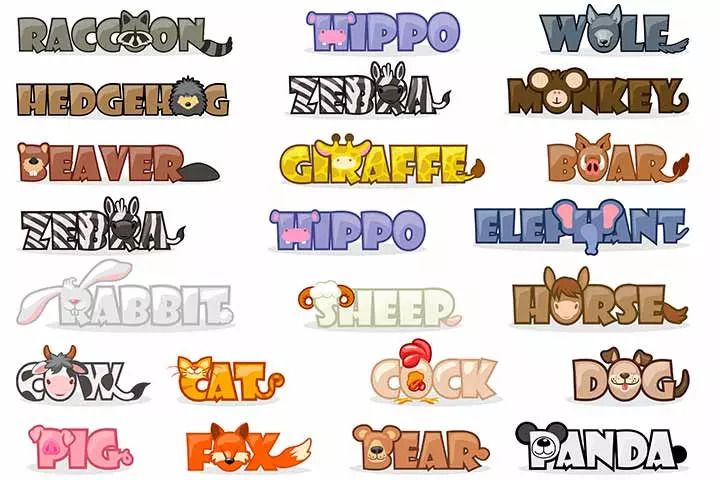
Image: Shutterstock
Name the animal is a multiplayer kids word game that can help teach your children animal names and improve their reasoning skills. This game also offers your child the opportunity to exercise their lateral thinking skills.
Age group: 4 to 7 years
No of players: 2 or more
How to play:
- You can be the host of the game.
- Make a list of common animals and a list of words that rhyme with these animal names.
- Call out each player and present them a rhyming word, and let them guess the animal name. You can say things like, “I rhyme with fog. I am a …..”
- The player who gets the maximum words correct is the winner.
- You can also teach them animal sounds by substituting animal names with their sounds.
3. I spy

Image: Shutterstock
I spy is one of the easiest games of the lot. All you need is your imagination and some eager players.
Age group: 4 to 6 years
No of players: 2 or more
How to play:
- Locate an object, and tell your child its first letter saying, “I Spy an object starting with the letter ….”
- Your child looks around and recognizes each object corresponding to that letter.
- Stop when they get it right and continue the game with the next player.
- You can also mention the color or shape of the object and let your child guess it correctly.
4. Make a word
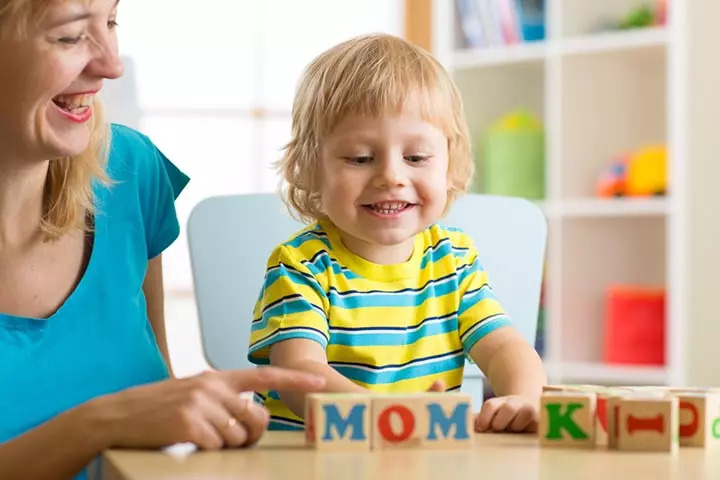
Image: Shutterstock
If your child is starting to learn new words, this word game for kids is useful. You can also play this game with older kids to make them learn difficult words and improve their memory. This game lays a solid foundation for playing advanced spelling games, such as Scrabble.
Age group: 4 to 12 years
No of players: 2 or more
How to play:
- You can play this game with younger children if you have magnetic letters, plastic letters, letter mats, or letter blocks.
- Give them a set of letters and ask them to make two- or three-letter words with them.
- For older children, you can play the game mentally or write a set of letters on a piece of paper and ask them to make as many words as they can from them.
- You can even play a timed version of the game with older children as they enjoy a good challenge.
5. Rhyming words

Image: Shutterstock
Rhyming Words game is a variation of Name the Animal. This word game for kids encourages your child to learn new words and helps hone their reasoning skills.
Age group: For ages 3 to 6 years
No of players: 2 or more
How to play:
- Name any animal.
- Ask your children to say the words that rhyme with the name of the animal, in turns.
- For example, when you say the word “dog,”your children should come up with words such as fog, hog, and log.
- Continue with a player until they run out of words and repeat the game with the next player.
6. Name, place, animal, thing

Image: IStock
You might remember playing this game as a child yourself. This game helps in expanding your child’s knowledge and memory.
Age group: 5 years and above
No of players: 2 or more
How to play:
- Give each player a sheet of paper and a pencil.
- Say a letter of the alphabet and start a timer.
- Each player must write the words of a name, place, animal, or a thing starting with that letter. For example, if the letter is A, a player may write, “Alex, Australia, Ape, Apple,” under each of these categories, respectively.
- You can assign different letters to different players or the same letter to each one.
- You can include other categories as per your convenience.
7. Hink pink
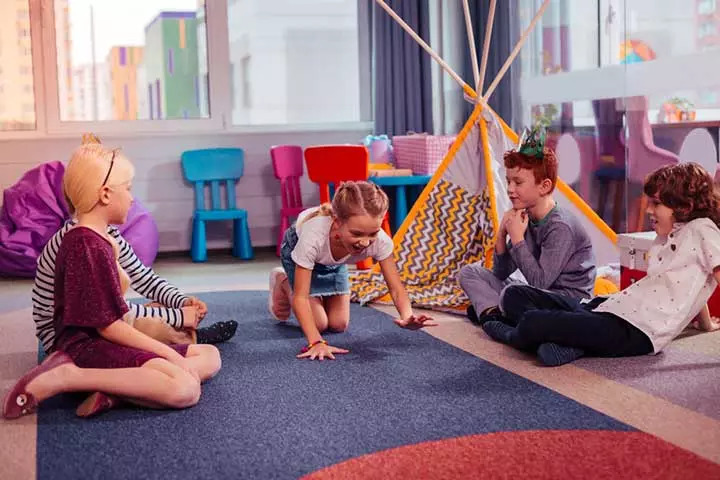
Image: Shutterstock
Children love this game. This word game for kids is designed to maximize fun while learning new words and their meanings. The game can help improve your child’s ability to solve crossword puzzles and cryptic crosswords.
Age group: 4 to 12 years
No of players: 2 or more
How to play:
- Ask each player to come up with a set of rhyming monosyllabic words, e.g., fat rat.
- Help them make a clue about their words. In this case, the clue will be “a rodent that is not thin.”
- Each player says their clue aloud, and the others try to guess what the rhyming words are.
- If the children are older, you can play Hinky Pinky (two-syllable words) or Hinketty Pinketty (three-syllable words). You can even make different combinations between different syllabic words.
- Ask the children to act out the words too so that all of you have lots of fun while the children learn difficult words.
- Here are some more words to get you started: Thin Pin, Big Pig, Tan Pan, Fan Man.
8. Guess the correct word
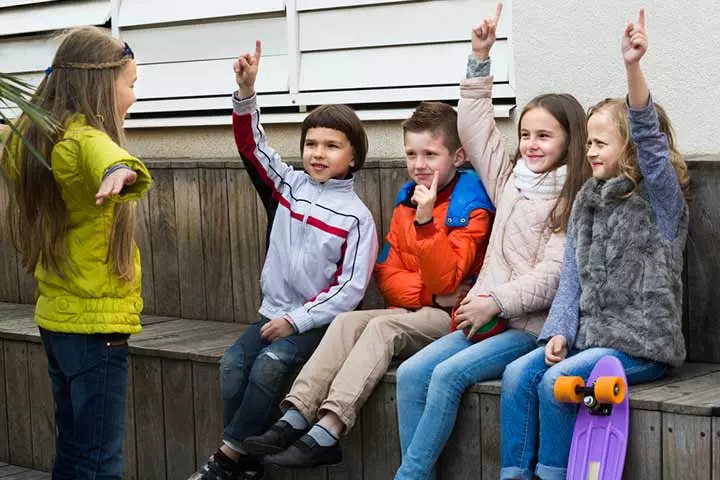
Image: Shutterstock
This word game for kids, if played mentally, is an excellent way to boost your child’s memory. It is a simple game and can be played with pencil and paper if you want to keep score.
Age group: 6 years and above
No of players: 2 or more
How to play:
- The first player thinks of a word and announces its first letter and the number of letters in the word to the others. If the player has thought of the word “Bananas,” they should say B and 6.
- The other players have to guess the word using these clues.
- If a player says another word but it has some matching words with the original word, the first player will say that the word is wrong but there are matching letters in the correct places or the wrong places.
- The next player uses these clues to make the next guess.
- You can keep the words simple or difficult according to the age of the children.
- As for the example of Bananas:
Player 2: Bullock
Player 1: That is incorrect
Player 3: Bahamas
Player 1: That is incorrect, but the As are in the correct place,
and so on.
9. Word hunting
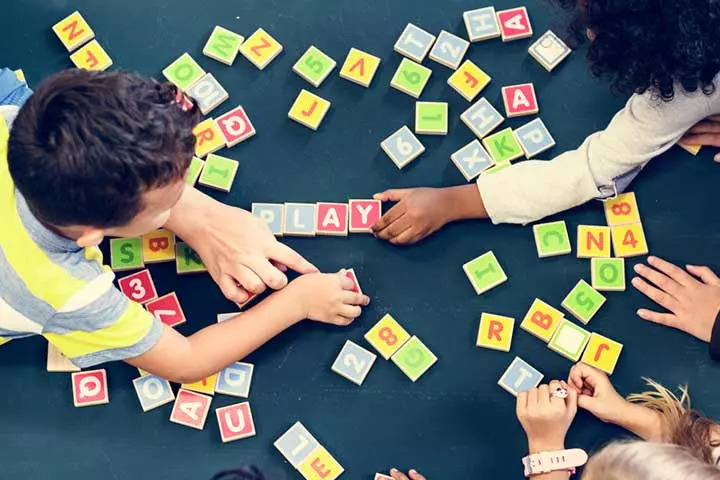
Image: Shutterstock
If your child is just learning the alphabet, this is an easy game to play. However, you can make some minor changes and tweak it for older children.
Age group: 4 to 7 years
No of players: 2 or more
How to play:
- Scatter magnetic letters, plastic letters, or letter blocks on a table.
- Ask your child to pick up a letter from the lot.
- For older children, you can write three- or four-letter words on little chits of paper and do the same procedure as above.
- For children who can read, you can ask them to pick words they see outside shops, etc.
10. Change one letter
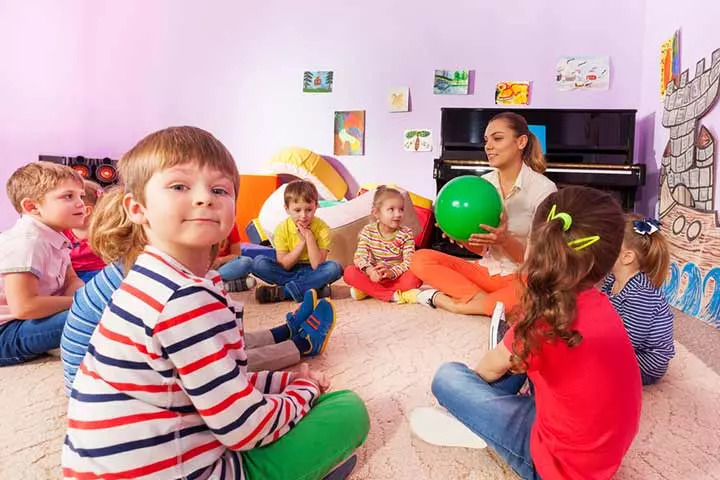
Image: Shutterstock
This is a great word game for school children. The game promotes out-of-the-box thinking and allows your child to come up with new words and even their meanings.
Age group: 5 to 10 years
No of players: 4 or more
How to play:
- Begin with a short word that has three, four, or five letters (according to the age of the children).
- Ask the children to take turns in calling out new words by changing just one letter of the previous word. E.g., park – part – dart – dark / mark – mare – mart / cart – care – case – cast – mast (and so on).
- You can set a timer or divide the players into teams to make the game more exciting.
11. Call my bluff
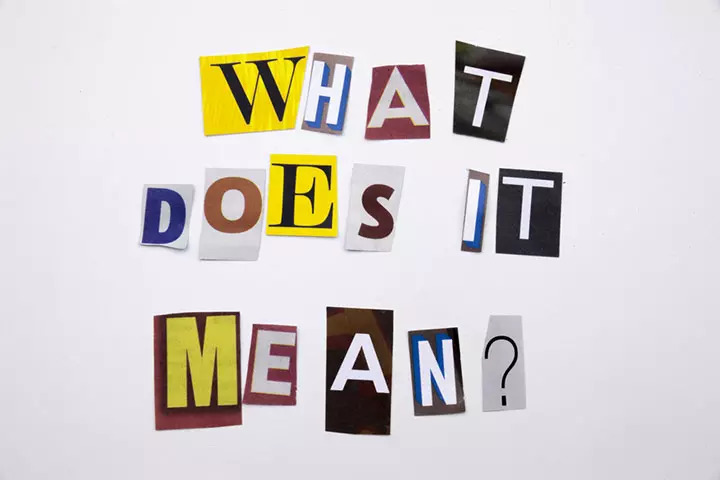
Image: Shutterstock
Call my bluff is commonly played at sleepovers and during picnics and is an excellent word game for older children.
Age group: 8 years and above
No of players: 4 or more
How to play:
- Divide the children into teams.
- Give them a set of words that are common but unfamiliar to them.
- Ask each team to look up the meaning of each word, and make up two wrong meanings for each word.
- Each team asks the other team the meaning of a word and gives them the three options.
- If the opposite team guesses the correct meaning, they get points. If they don’t, the team that asked the meaning gets the point.
- For example, let us take the word “Bewildered.” You can give three choices (a) to be left in the wild, (b) shocked or surprised, and (c) out-of-control behavior.
12. Unscramble the words
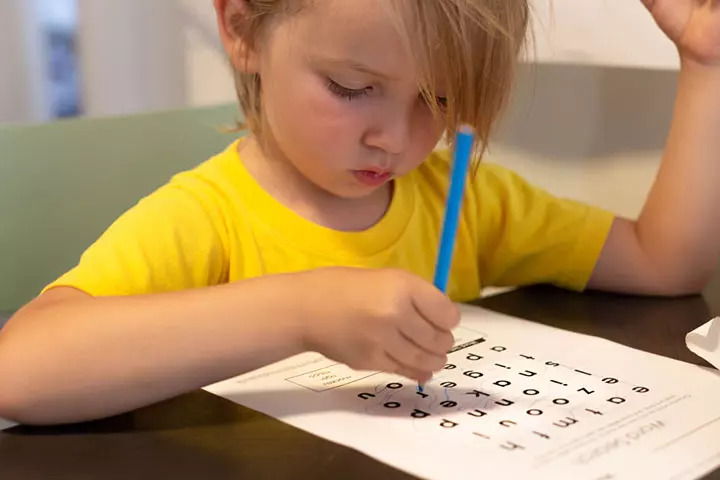
Image: Shutterstock
Let your children put on their thinking caps and play this game. The word game makes your child think and helps stir their imagination and improve their reasoning skills.
Age group: 5 years and above
No of players: 2 or more
How to play:
- Think of a word and write it down on paper but in a scrambled form.
- Your child has to think and arrange the word in the right sequence.
- You could even give clues so that they can unscramble the word faster.
- You could also write down a set of scrambled words, set the timer, and ask them to solve as many as they can within the allotted time.
13. Tell me a story

Image: Shutterstock
Children are incredibly imaginative. Children, as young as three years old, start making imaginary stories. You can play this game to fire your child’s imagination.
Age group: 5 years and above
No of players: 2 or more
How to play:
- Start a “story” with a sentence.
- The next player should say another sentence and continue the story.
- As the story grows, it becomes hilarious and absurd.
- For example, you start with the sentence, “In a village, there was a man named Joe.” The next player can say, “He wore a red shirt every day,” and the next player may say, “One day, a bull charged at him,” and so on.
14. Words in a word
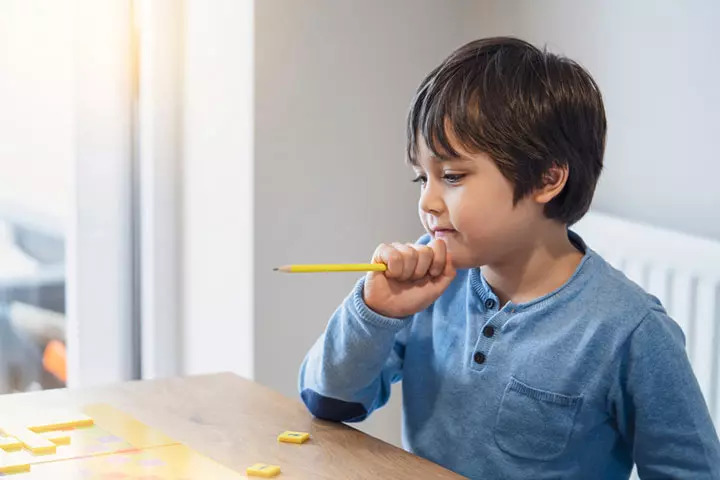
Image: Shutterstock
This is one of the most popular word games for kids and one of the best word-building games of all time. It is useful in improving your child’s English, if it is not your native language. You might have played this game in your childhood. It is now your children’s turn to play the game and keep the tradition alive.
Age group: 5 years and above
No of players: 2 or more
How to play:
- Think of a long word. A popular word choice for this game is “Constantinople.”
- Ask your child to write words starting with each letter in the word. They should use the letters contained in the word only.
- For example, Constantinople can have words such as con, cot, on, oil, no, nap, sit, and sip.
- You can set a timer and ask your child to write down as many words as they can within the given time frame.
15. I’m going on a picnic
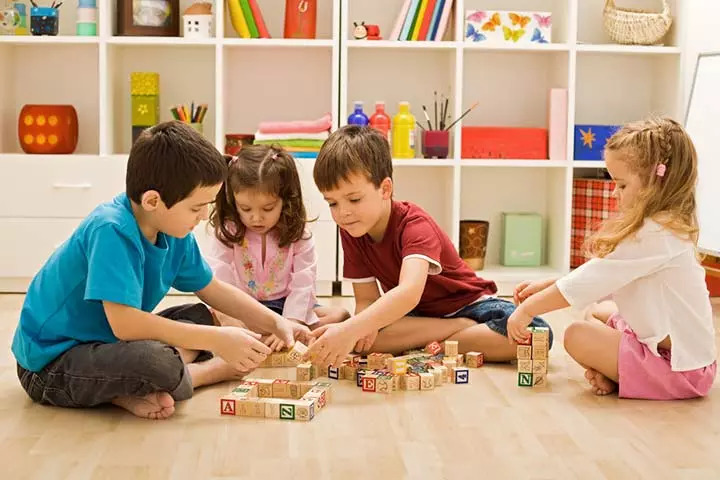
Image: Shutterstock
This game is for older children. It helps hone their creative skills and improves their memory. The word game is usually played in classrooms, but they can play it at a sleepover or even with you as a family game.
Age group: 5 years and above
No of players: 3 or more
How to play:
- The first player starts by saying, “I’m going on a picnic, and I will bring a ….”.
- The next player adds an item to the list and repeats the words.
- Each player has to repeat the items named in the exact sequence.
- If a player forgets a name or the sequence, they are out of the game.
- You can either start the game all over again or ask the next player to pick up the sequence and continue.
- For example, the game goes as follows:
Player 1: I’m going on a picnic, and I will bring a cookie.
Player 2: I’m going on a picnic, and I will bring a cookie and a Popsicle.
Player 3: I’m going on a picnic, and I will bring a cookie and a Popsicle and a bottle of juice, and so on.
16. Crosswords
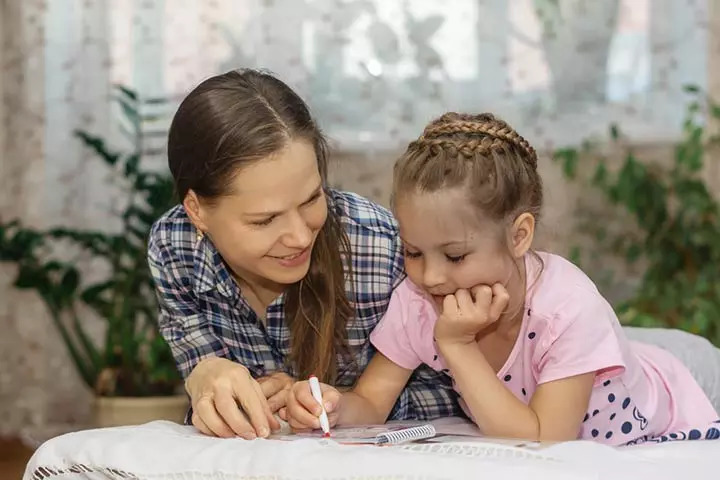
Image: Shutterstock
Solving crosswords requires practice and a lot of patience. The game will not only teach your children new words but also develop their deductive reasoning skills to a great degree.
Age group: 6 years and above
No of players: 1
How to play:
- Draw a grid with white and black squares and number each row and column.
- Then, write a set of clues at the bottom of the grid with the corresponding row or column number.
- Ask your child to solve the crossword.
- You can set a timer to make the game challenging.
- You can get some printable crosswords with clues easily on the Internet (you will find some free and printable crosswords in this link). Crosswords regularly appear in newspapers and magazines.
17. Word quest
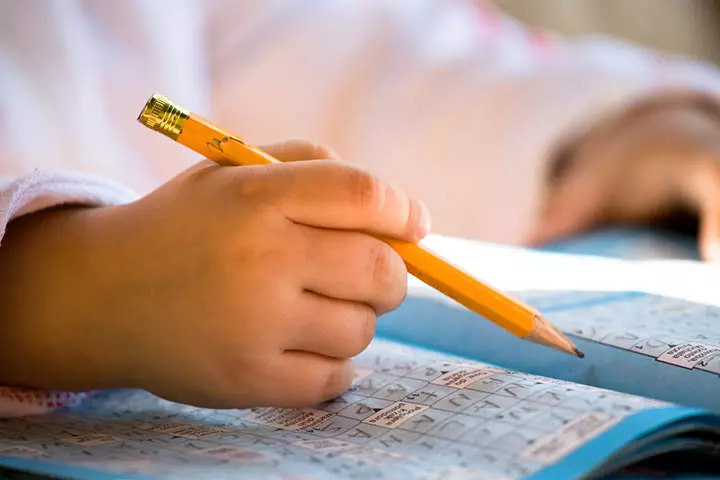
Image: IStock
Word quest is a word game for older kids. The game involves searching for words using single letters and makes your children use their deduction skills.
Age group: 5 years and above
No of players: 2 or more
How to play:
- Draw a 10×10 or 12×12 grid on a sheet of paper and divide it into squares.
- Write various words below and to the side of the grid.
- Write random letters in random squares.
- Ask your child to fill in the grid using the words you have written outside the grid.
18. Consequences

Image: Shutterstock
This word game helps stir the imagination and encourages creativity. The game works well with both children and adults.
Age group: 5 years and above
No of players: 2 or more
How to play:
- The first player writes down a sentence on a sheet of paper and passes it on to the next player.
- The next player writes the next sentence and passes it on.
- Once all the players are done with adding their sentences, you can read out the story.
- You can also write 4–5 sentences with open endings on a sheet of paper and hand them over to each player. Each player writes their version of the story and reads it aloud at the end of the game.
- For example, you can write, “There was a man named …….. He …………. a woman named ……………. They went to …………. He said, “…………………” She said, “……………………” And then, ……………..” and so on.
19. Scrabble
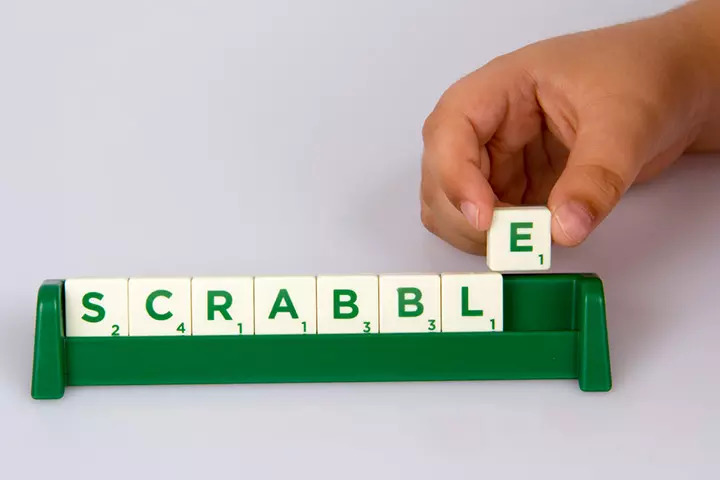
Image: IStock
Scrabble is a popular classic word game for kids. If you want your child to learn new words, this is one of the best games.
Age group: 6 years and above
No of players: 2 or more
How to play:
- Get a scrabble boards.
- Set it up and read the rules.
- The number on each letter tile tells you how many points it’s worth, and the squares on the board tell you how many points you scored.
- The player who gets the maximum score is the winner.
- After a game of Scrabble gets over, the board looks similar to a crossword.
20. Pass the bomb
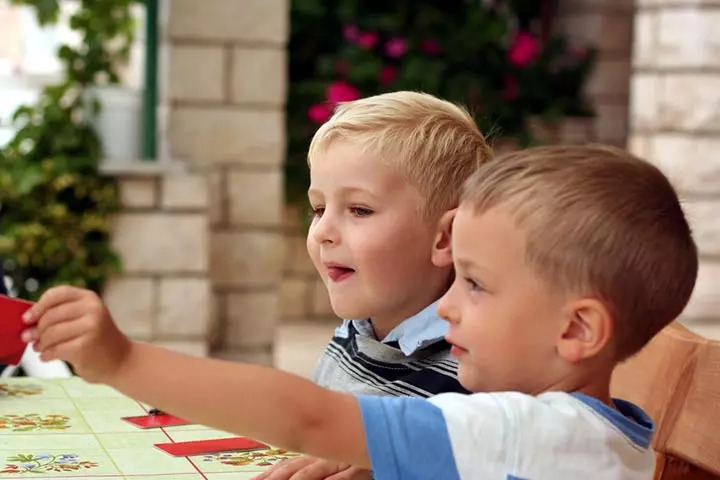
Image: Shutterstock
Pass the bomb is an educational game that will test your child’s alacrity. The first player should say a word and pass the bomb as quickly as possible to the next player, who must say a similar-sounding word. The players need to be quick in passing the bomb before it explodes. You can get this board game at a shop or simply make your own set.
Age group: 5 years and above
No of players: 2 or more
How to play:
- Take a set of card papers and write two- and three-letter words on them with a marker.
- The first player picks up a card and passes it around.
- The “bomb” goes off after a certain time. If you have made the cards at home, you can use a timer or even play music.
- The moment the timer goes off (or the music stops), the player holding the card is out.
- However, before leaving, they have to say a word that contains the word written on the card.
- For example, if the card has “ART” written on it, the child who gets out can say a word with ART in it, such as part, mart, or cart.
1. How can word games help children improve their spelling skills?
When children engage in word games, they are required to focus on the spelling of various words, which helps them to learn and remember the correct spelling of those words.
2. In what ways can word games help children with their grammar?
Word games encourage children to think about language playfully and engagingly, making it easier to understand and remember grammar rules. Word games can also help expand children’s vocabulary, an essential component of good grammar. By learning new words and their meanings, children can improve their ability to express themselves clearly and accurately.
3. How can word games help children improve their vocabulary?
Word games are an excellent way to improve children’s vocabulary skills, as they help them learn new words and reinforce their understanding of familiar ones. Games such as Scrabble, Boggle, and crossword puzzles challenge children to think critically and creatively about words, requiring them to use problem-solving skills to develop new words and find hidden ones.
4. How can word games help children become better readers?
Word games can help children become better readers by improving their vocabulary, spelling, and comprehension skills. Such games require children to identify and create words, helping them to recognize new words and understand their meanings. This eventually improves their reading skills.
When education is imparted as activities and games, children tend to grasp it much faster and retain it longer. So, if you want your children to have great communication skills, fluent vocabulary, and fascinating imagination, involve them in word games for kids. Games, such as I spy, make a word, or hink pink, are effective in keeping children engaged and sharpening their grammar and vocabulary. Another good thing about these games is that you can be involved in playing too. So, choose a suitable word game according to your child’s age and have fun while playing.
Key Pointers
- Word games stimulate the brain to improve reasoning skills, vocabulary, and language skills.
- Spur creativity through games such as I spy, rhyming words, and hink pink.
- Test the memory with games such as guess the correct word and make a word.
Was this article helpful?
The following two tabs change content below.
- Reviewer
- Author
Games Magazine Presents Word Puzzles, a graphical potpourri of word games for players too smart or bored with the shareware shoot-em-up scene. Includes 20 puzzles — Crosswords, Cryptograms, Double Crosses, Word Scrambles, and Quote Boxes. Features very nice graphics and an original musical score for most sound cards. By MVP Software and Villa Crespo Software. Req VGA; supports most sound cards.
- Addeddate
- 2012-08-31 09:07:07
- Emulator
- dosbox
- Emulator_ext
- zip
- Emulator_start
- GAMES.BAT
- Identifier
- GamesMagazinePresentsWordPuzzles
- License
- shareware
- Year
- 1994
comment
Reviews
Reviewer:
JaredKFan
—
favoritefavoritefavorite —
July 31, 2019
Subject:
Looking for full version of this
Does anybody know where I can find a full version of this game? All I’ve been able to find is the shareware edition, and the game company that published it no longer exists,
Игры в слова (также называемая игра в слова головоломки или поиск слов игры) — это разговорные или настольные игры, часто предназначенные для проверки навыков владения языком или изучения его свойств.
Игры в слова обычно используются в качестве развлечения, но могут дополнительно служить образовательной цели. Маленькие дети могут играть в такие игры, как Палач, естественным образом развивая такие важные языковые навыки, как правописание. Исследователи обнаружили, что взрослые, которые регулярно решали кроссворды головоломки, требующие знакомства с более широким словарным запасом, в более позднем возрасте улучшали работу мозга.
Популярные словесные игровые шоу были частью телевидения и радио на протяжении всей истории вещания, включая Spelling Bee (первое телевизионное игровое шоу) и Wheel of Fortune (самое продолжительное синдицированное игровое шоу в США).
Содержание
- 1 Категории словесных игр
- 1.1 Игры с расположением букв
- 1.2 Игры с бумагой и карандашом
- 1.3 Смысловые игры
- 2 Современные игры в слова
- 3 Игры со словами в медиа
- 3.1 Разное
- 4 См. Также
- 5 Ссылки
Категории словесной игры
Игры с расположением букв
В игре с расположением букв цель состоит в том, чтобы формировать слова из данные буквы. Эти игры обычно проверяют словарный запас, а также навыки нестандартного мышления. Некоторые примеры игр с расположением букв включают Scrabble, Upwords, Bananagrams, Countdown и Мягкую обложку.

Игры с бумагой и карандашом

В игре с бумагой и карандашом игроки пишут свои собственные слова, часто с определенными ограничениями. Например, кроссворд требует, чтобы игроки использовали подсказки, чтобы заполнить сетку со словами, пересекающимися по определенным буквам. Другие примеры игр с бумагой и карандашом включают Hangman, Scattergories, boggle и поиск слов.
Семантические игры
Семантические игры сосредоточены на семантике слов, используя их значения и общие знания игроков в качестве механики. Mad Libs, Blankety Blank и Codenames — все это семантические игры.
Современные игры в слова
В рамках современного «Золотого века» настольных игр дизайнеры создали множество новых, нетрадиционных игр в слова, часто с более сложными правилами. Такие игры, как Codenames, Decrypto и Anomia, были разработаны после 2010 года и получили широкое признание. Мобильные игры, такие как Words with Friends и Word Connect, также принесли современной аудитории игры со словами.
Игры в слова в средствах массовой информации
Многие популярные игры в слова были адаптированы для игровых теле- и радиопередач. Как и в приведенных выше примерах, такие показы, как Lingo, Says You!, Catchphrase и Only Connect, либо вращаются вокруг, либо включают элементы словесных игр.
Разное
- Амбиграммы
- К счастью, к сожалению
- Ребусы — головоломки с картинками, представляющие слово
- Словесная арифметика
См. Также
- Словарь анаграмм
- Двусмысленность
- К счастью, к сожалению
- Языковая игра
- Список видеоигр-головоломок
- Онлайн-игра в слова
- Фоно-семантическое сопоставление
- Каламбуры
- Пазлы
- Игра в слова
- Word Ways : Журнал развлекательной лингвистики
Список литературы
- ^«Да, разгадывание кроссвордов МОЖЕТ сделать вас умнее | Reader’s Digest». Ридерз Дайджест. 2017-07-25. Проверено 6 октября 2018 г.
- ^«Лучшие игры и снаряжение для ночной игры». TechCrunch. Проверено 6 октября 2018 г.
- ^Даффи, Оуэн (14 августа 2018 г.). «Настольные игры: Ticket to Ride New York и Decrypto». хранитель. Проверено 6 октября 2018 г.
- ^Троуэр, Мэтт (21 февраля 2018 г.). «Лучшие викторины настольных игр». IGN. Проверено 6 октября 2018 г.
- ^«Zynga объясняет продолжение в словах с друзьями 2». Shacknews. Проверено 6 октября 2018 г.

